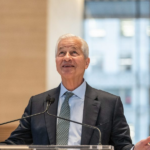Starbucks Corp. is grappling with an unprecedented 11-day streak of stock losses, sparking apprehension about a potential downturn in sales at the coffee giant. On Monday, the stock experienced a 1.6% decline, marking the 11th consecutive session of losses—the longest such streak since Starbucks went public in 1992. This slump has led to a remarkable 9.4% reduction in Starbucks’ market value, representing a staggering decline of nearly $12 billion.
Concerns about slowing sales at Starbucks gained traction, with third-party sales data indicating a “material slowing” in November. JPMorgan Chase & Co. analyst John Ivankoe noted this slowdown after Starbucks had reported robust comparable sales growth of 8% in the fiscal fourth quarter. Ivankoe adjusted his first-quarter US comparable sales estimate to a 4% growth compared to the same period last year, reflecting potential challenges with the Christmas holiday promotion compared to the successful fall Pumpkin Spice Latte event. His initial expectation was a 6% jump in quarterly domestic same-store sales.

Starbucks shares initially surged in the first half of November following positive quarterly results and a better-than-expected sales outlook for fiscal 2024. However, concerns about “still-slow China data” and sales trends have led to a two-week decline in the stock, according to Ivankoe, who maintains an overweight rating on Starbucks.
Analyst Nick Setyan from Wedbush Securities Inc. expressed investor nervousness about the possibility of US comparable sales falling short of consensus expectations in the current quarter. Credit card data signals a slowdown over the past three weeks, making Starbucks one of the stocks most sensitive to signs of consumer weakness. Setyan holds a neutral rating on Starbucks.
Sales trends in the snack and coffee industry, particularly for the seven-day period through Nov. 19, have decelerated on a week-over-week basis, as reported by data-driven research firm M Science. The sales slowdown was primarily driven by softer trends at Starbucks, exacerbated by boycotts and recent labor strikes, including disruptions on Red Cup Day (Nov. 16), which affected up to 200 locations in the US.
Starbucks’ shares have experienced a 1.6% decline year-to-date, in contrast to the 11% gain for the S&P 1500 Composite Restaurants Index.









